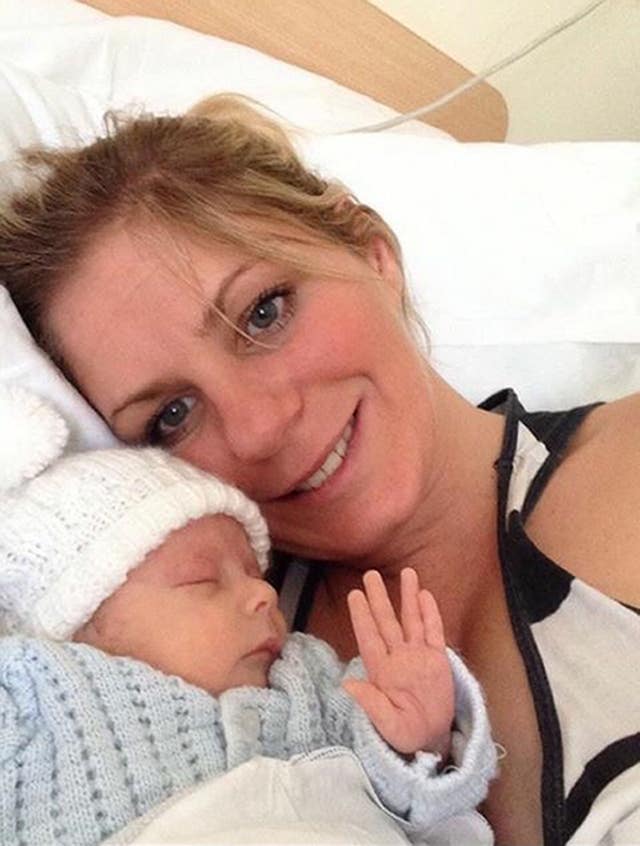Doctor describes delay in giving sick baby antibiotics, inquest hears
Ben Condon, who was two months old, died at Bristol Children’s Hospital in April 2015

Antibiotics prescribed for a premature baby suffering with a respiratory illness were not given until after he suffered the first of two cardiac arrests, an inquest heard.
Ben Condon, who was two months old, died at Bristol Children’s Hospital in April 2015.
He was being treated in the paediatric intensive care unit for acute respiratory distress syndrome (ARDS) and metapneumovirus (hMPV) – similar to the common cold in adults.
Avon Coroner’s Court heard that on April 17 Ben’s condition deteriorated and he suffered two cardiac arrests before dying.

It later emerged that before his death, Ben had also developed a pseudomonas bacterial infection.
The University Hospitals Bristol and Weston NHS Foundation Trust, which runs the children’s hospital, later admitted their failure to give Ben timely antibiotics contributed to his death.
Dr Jessica Spaull, who was a junior doctor on the unit, said she had been concerned about Ben that morning and had discussed this with his parents, Allyn and Jenny Condon.
She told the inquest she had a conversation with a consultant after the mid-morning ward round to give Ben antibiotics.
“I cannot recall any details of what I said but I recall the conclusion was that it would be reasonable to start Ben on antibiotics,” she said.
“I recall I was in the process of doing that (writing up the prescription) when another of my allocated patients… when their endocrinal tube was accidentally removed.
“I recall I went over to that bed in an emergency, and I recall that I was involved reintubating that patient.
“That meant I had not completed that prescription at that point.”
The inquest has heard that Ben, from Weston-super-Mare, North Somerset, suffered the first of two cardiac arrests that afternoon and died later that evening.

Dr Spaull told the hearing that later that day while completing a handover with the medical staff working the evening shift, she realised the antibiotics had not been administered.
“I recall looking at the drug chart and realising that the antibiotic prescribed earlier hadn’t been given,” she said.
“I mentioned this to one of the bedside nurses who had attempted help with the resuscitation.
“I recall mentioning to one of the other junior doctors.”
Jennifer MacLeod, representing the Condon family, asked Dr Spaull whether there was a “general consensus” among doctors that Ben’s respiratory illness was caused by a virus, rather than a bacterial infection.
Dr Spaull replied: “I think this is a really tricky question to answer for me just because, as a junior doctor on paediatric intensive care unit then, I still don’t have the expertise to have formulated ideas about ARDS causality because of my lack of experience in that area.”
Ms MacLeod asked whether there was a “level of complacency” about how poorly Ben was.
Dr Spaull said this question was hard for her to answer as at the time she was a junior doctor only five weeks into her first placement on a paediatric intensive care unit.
“For me, I had heard Ben’s parents were worried, and I was worried about Ben’s oxygenation in particular that morning,” she said.
“I think I would have judged how worried to be based on the experienced team’s assessment.
“I do not think I can comment on the specific question.”
She added: “I think that while I was not experienced in ARDS, I was able to make an assessment of a patient in intensive care as that was what I had been doing for the past five weeks, but also on a neo-natal intensive care unit prior to that.
“I recall having dialogue about my patients that I was concerned was.
“I think I would have made an assessment, which would have been appropriate for a junior doctor on the unit to make, and I think I would have discussed that assessment with a consultant in an open dialogue because they were present.
“In terms of specifics I can’t recall those conversations.”
The inquest continues.





